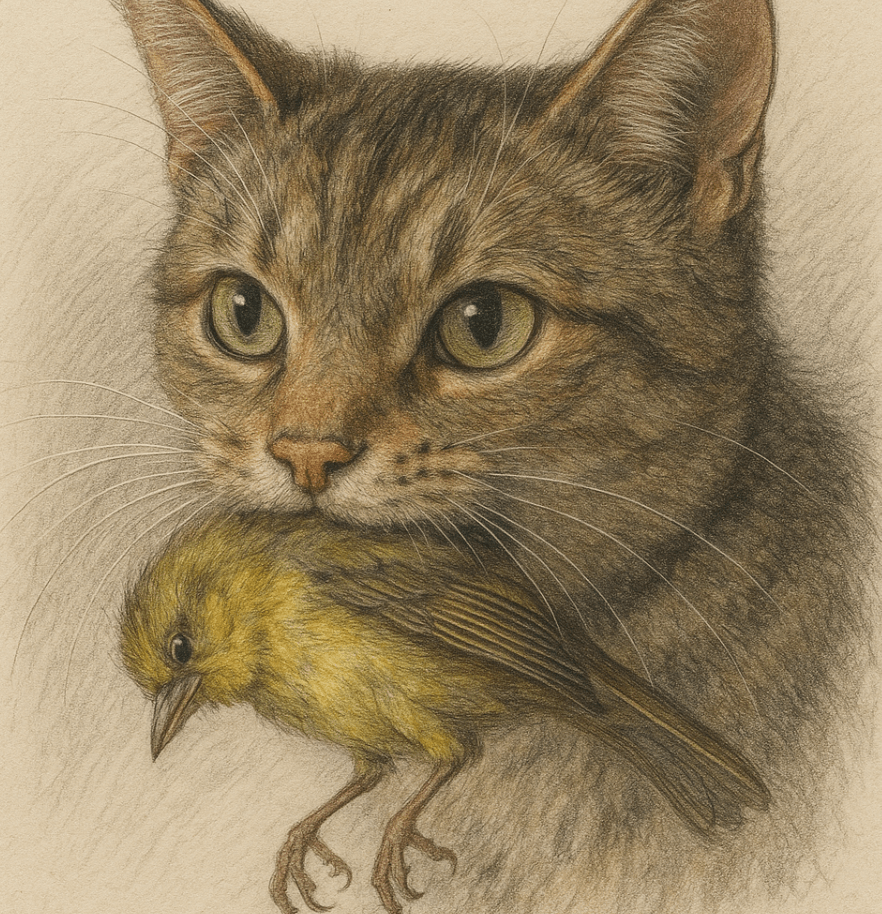Can Cats Eat Birds? Understanding Their Natural Instincts and Dietary Needs
Cats are natural-born hunters, and their fascination with birds is no secret. From stalking to pouncing, their predatory instincts are hardwired into their DNA. But when it comes to actually eating birds, many cat owners wonder whether this behavior is safe or appropriate. While cats may instinctively hunt birds, there are important considerations to keep in mind regarding their health, safety, and the ethical implications of such behavior. In this blog post, we’ll explore the topic of cats eating birds, addressing the risks, benefits, and how to manage this instinct in a responsible way. Whether you’re a curious pet owner or simply want to understand your feline friend better, this guide will provide valuable insights into this age-old question.
The Natural Instincts Behind Cats Eating Birds
Cats are obligate carnivores, meaning their diet consists primarily of meat. Hunting birds is an instinctual behavior that reflects their wild ancestry and survival skills. Here’s what drives this behavior and what it means for your domesticated cat.
Hunting as a Survival Skill:
In the wild, cats rely on hunting small prey like birds to meet their nutritional needs. This instinct remains strong even in well-fed house cats.Playful Behavior:
Domestic cats often hunt birds not out of hunger but for stimulation and entertainment, mimicking their natural play patterns.Territorial Instincts:
Cats may view birds as intruders in their territory, prompting them to chase or capture them.Curiosity and Exploration:
Birds’ movements and sounds naturally attract cats, triggering their curiosity and desire to investigate.Genetic Programming:
Even indoor cats retain the hunting instincts of their ancestors, making bird-chasing a deeply ingrained behavior.
Understanding these instincts helps explain why cats are drawn to birds, even if they don’t always intend to eat them.
Potential Risks of Cats Eating Birds
While cats may occasionally catch and eat birds, this behavior comes with several risks that every pet owner should be aware of. These hazards can affect both your cat’s health and local ecosystems.
Parasites and Diseases:
Birds can carry parasites like tapeworms or diseases such as avian flu, which can be transmitted to cats upon consumption.Toxins and Poisons:
Birds exposed to pesticides or environmental toxins may pass harmful substances to cats who eat them.Choking Hazards:
Feathers, bones, or other parts of the bird can pose choking risks or cause internal injuries.Nutritional Imbalance:
Birds do not provide a complete and balanced diet for cats, potentially leading to deficiencies over time.Impact on Wildlife:
Frequent hunting by domestic cats can harm local bird populations, disrupting ecosystems and biodiversity.
These risks highlight the importance of monitoring and managing your cat’s interactions with birds.
Check this guide 👉Can Cats Eat Tamales? Best 7 Expert Tips!
Check this guide 👉Can Cats Eat Curry? Best 7 Expert Tips!
Check this guide 👉Can Cats Eat Gravy? Best 7 Expert Tips!

Ways to Protect Birds from Cats | How to Redirect Your Cat’s Hunting Instincts |
|---|---|
Install window decals to deter birds | Provide interactive toys like feather wands |
Create a bird-safe garden with dense shrubs | Use puzzle feeders to stimulate mental activity |
Supervise outdoor time for your cat | Offer safe, cat-friendly “prey” toys |
Keep cats indoors during peak bird hours | Train your cat with positive reinforcement |
Use deterrent sprays near bird feeders | Engage in regular play sessions to burn energy |
How to Manage Your Cat’s Bird-Hunting Behavior
If your cat has a habit of hunting birds, there are steps you can take to redirect their instincts and minimize harm. Here are some actionable tips to help manage this behavior responsibly.
Keep Your Cat Indoors:
Keeping your cat indoors eliminates their access to birds and reduces risks to both parties.Provide Enrichment Activities:
Toys that mimic birds, such as feather teasers or motorized mice, can satisfy your cat’s hunting drive safely.Use Collars with Bells:
Attaching a bell to your cat’s collar alerts birds to their presence, giving them time to escape.Create a Bird-Friendly Yard:
Design your outdoor space with features like birdhouses and dense foliage to protect visiting birds.Teach Recall Commands:
Training your cat to come when called allows you to intervene before they chase or harm birds.
By implementing these strategies, you can reduce the likelihood of your cat harming birds while still honoring their instincts.
Ethical Considerations of Cats Hunting Birds
The relationship between cats and birds isn’t just about individual pets—it also raises broader ethical questions about wildlife conservation and responsible pet ownership.
Impact on Bird Populations:
Studies show that domestic cats contribute significantly to declines in bird populations, especially endangered species.Responsibility of Pet Owners:
Owners have a duty to prevent their cats from harming wildlife, balancing their pets’ needs with environmental stewardship.Community Awareness:
Educating others about the impact of free-roaming cats can foster collective efforts to protect local ecosystems.Adopting Indoor Lifestyles:
Encouraging indoor living for cats benefits both the animals and the environment by reducing predation and exposure to dangers.Supporting Conservation Efforts:
Participating in initiatives to protect bird habitats can offset some of the damage caused by domestic cats.
Addressing these ethical concerns ensures a harmonious coexistence between cats, birds, and humans.
Common Misconceptions About Cats and Birds
Several myths surround the interaction between cats and birds. Clearing up these misconceptions helps foster a better understanding of their dynamic.
Myth: All Cats Hunt Birds Out of Hunger:
Many cats hunt purely for sport, regardless of whether they’re hungry.Myth: Indoor Cats Don’t Have Hunting Instincts:
Even indoor cats exhibit hunting behaviors, though they lack access to live prey.Myth: Birds Are Safe in Urban Areas:
Urban birds face significant threats from free-roaming cats, despite human presence.Myth: It’s Impossible to Train Cats Not to Hunt:
With consistent training and enrichment, cats can learn to redirect their instincts.Myth: Cats Only Target Sick or Weak Birds:
Healthy birds are equally vulnerable to predation by cats.
Dispelling these myths promotes a more informed approach to managing cats’ interactions with birds.
Health Risks for Birds Caused by Cats
Beyond the immediate danger of being caught, birds face additional threats when interacting with cats. Understanding these risks underscores the importance of intervention.
Stress and Injury:
Even brief encounters with cats can leave birds stressed or injured, reducing their chances of survival.Disease Transmission:
Cats can spread diseases like toxoplasmosis to birds through contact or contamination.Nest Disruption:
Cats prowling near nests can scare off parent birds, leaving eggs or chicks vulnerable.Population Decline:
Frequent predation contributes to declining bird populations, particularly among ground-nesting species.Secondary Predators:
Injured birds abandoned by cats become easy targets for larger predators.
Protecting birds from these threats benefits entire ecosystems and preserves biodiversity.
Fun Alternatives to Satisfy Your Cat’s Hunting Drive
Redirecting your cat’s hunting instincts doesn’t mean denying them fun—it means providing safer outlets for their energy and curiosity.
Interactive Laser Toys:
Laser pointers simulate quick-moving prey, engaging your cat’s chasing instincts without harming real animals.Catnip-Infused Toys:
Toys infused with catnip mimic the thrill of the hunt while keeping your cat entertained indoors.Feather Wands:
Handheld wands with feathers allow you to control the “prey,” offering supervised fun for your cat.Food Dispensing Toys:
Puzzle toys that release treats encourage problem-solving and mimic the satisfaction of a successful hunt.Window Perches for Bird Watching:
Installing perches near windows lets your cat observe birds safely from afar, satisfying their curiosity without risk.
These alternatives ensure your cat stays happy and engaged while protecting wildlife.
Frequently Asked Questions About Cats Eating Birds
Is it normal for cats to eat birds?
Yes, it’s a natural behavior rooted in their predatory instincts, though domesticated cats typically don’t rely on birds for sustenance.
Can eating birds make my cat sick?
Yes, consuming birds can expose cats to parasites, diseases, or toxins, posing health risks.
How can I stop my cat from hunting birds?
Keeping your cat indoors, providing enrichment, and using deterrents can help curb this behavior.
What should I do if my cat catches a bird?
Safely separate the bird from your cat and assess its condition. Contact a wildlife rehabilitation center if needed.
Are indoor cats less likely to hunt birds?
Yes, indoor cats have limited access to birds, reducing opportunities for hunting.
Balancing Cats’ Instincts with Responsible Ownership
Cats eating birds is a complex issue that involves understanding their natural instincts, mitigating risks, and considering the broader impact on wildlife. While hunting is an inherent part of a cat’s nature, responsible pet ownership requires finding ways to manage this behavior safely and ethically. By keeping your cat indoors, providing enriching alternatives, and supporting conservation efforts, you can ensure a harmonious balance between your feline companion and the world around them. With patience and care, you can honor your cat’s instincts while protecting the delicate ecosystems they share with birds.
Can a Cat Be Tested for Rabies? Best 7 Expert Tips! – Learn if testing is possible, understand the process, and discover prevention tips to keep your cat safe from rabies.
Can a Dog Be Tested for Rabies? Best 7 Expert Tips! – Learn how rabies testing works, why it’s critical, and what every dog owner needs to know.
Best Vegetables for Cat Food: Best 7 Expert Tips! – Discover safe, nutritious veggies to boost your cat’s diet, support digestion, and enhance overall health naturally.
Best Vegetables for Dog Food: Best 7 Expert Tips! – Discover safe, nutritious veggies to boost your dog’s diet, support digestion, and enhance overall health naturally.




